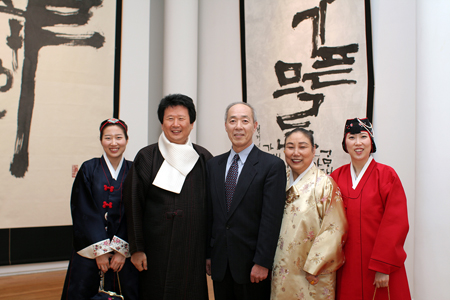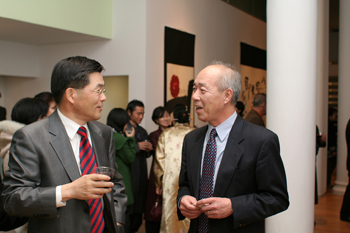 |
NEWSLETTERS
|
|
|
MARCH 2008
This month we asked calligrapher Dojun Jung, who had a solo
exhibition in February, to write about his experience working with Tenri
Cultural Institute.

The artist (second from left) with his family
 |
| With Korean Consul General
Kyung-Keun Kim at the opening |
Good Fate
by Dojun Jung, Calligrapher
When I visited Tenri Cultural Institute in New York four years ago I didn’t
know anything about Tenrikyo. A friend of mine, a newspaper editor in
Korea, told me about a very nice gallery exhibition space and recommended
that I pay them a visit. So I did and was introduced to Reverend Okui,
who gave me a tour of the space.
As a calligrapher, New York was uncharted territory for me. Although I’ve
had numerous exhibitions in Seoul, and in Europe—ten shows in Germany,
France, and Italy over the past eight years—doing my first show
in New York seemed like a daunting task. My first exhibition in America
occurred in the winter of 2006 when I was invited by the Jordan Schnitzer
Museum of Art in Oregon to present some of my work. The show was a success
and the museum ultimately decided to purchase six of the 90 works for
their permanent collection. Coincidentally, that same zyear, Dr. Thalia
Vrachopolous, curator of Tenri Cultural Institute, visited my atelier
in Seoul and I had accepted her proposal to do my first show in New York
at Tenri Cultural Institute.
My past shows have mostly been at museums and other very spacious sites
where I would exhibit somewhere between 80 to 110 pieces. Over the years,
I have presented Korean calligraphy in Europe with a variety of materials
in addition to paper, including silk, pots, and fans. In comparison to
the past spaces, Tenri is a smaller space, but it has high ceilings and
a relaxed atmosphere, and its beautiful architecture presented an ideal
exhibition space. For this exhibition, I attained the floor plan of the
space and was mindful of the walls’ measurements as I spent a year
and half creating the pieces. Arriving in New York, I breathed a sigh
of relief when I saw that my pieces fit well with the space. I was slightly
worried about exhibiting only a handful of pieces this time, but such
worry dissipated with the encouraging words from visitors and critics.
I was reunited with Rev. Okui after the installation was complete and,
once he discovered that I was The artist (second from left) with his family
the same calligrapher who had visited four years ago, he expressed his
delight in the fact that the exhibition had come to fruition. Rev. Okui
and his staff were very kind to me and my family throughout and we didn’t
have a single glitch in putting up the show. The staff members attended
the party after the opening and they became friendlier and closer to me
as I spent more time with them. There was no friction from the fact that
I was Korean and of a different religion and they were Japanese. We became
convinced that we could both be great friends.
Frankly, I do not know much about Tenrikyo. But there is something I can
say for sure, and that is all the Tenrikyo people I have met are very
kind and considerate. We use the word “inyeon” or “fate”
in Korean a lot. I take it to mean that people you meet in the present
life you have already had some kind of a connection with in a past life.
So, in that sense, I believe that it was fate that I was able to meet
Mr. Yuge, Rev. Okui and the staff members of Tenri Cultural Institute.
My family and I are sincerely grateful for their hospitality and kindness,
and we will wish for their continued success and happiness.
|
|

